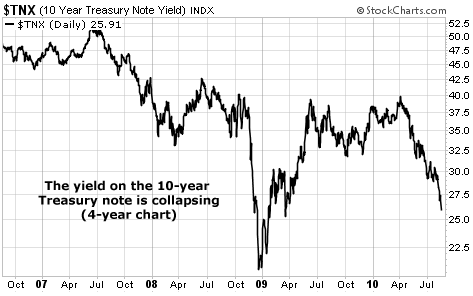| Home | About Us | Resources | Archive | Free Reports | Market Window |
Wall Street Legend: This Market Just Flashed a Huge Warning SignalBy
Tuesday, August 17, 2010
David Rosenberg calls it the smoking gun...
Rosenberg and I just spoke on the phone. You might not know his story, but David Rosenberg is a Wall Street legend.
He is famous for being a bearish economist at the most bullish firm on Wall Street. When the housing market was in a roaring boom, Merrill Lynch was making billions. But Rosenberg, Merrill's chief economist, was warning about recession and a bear market in stocks. He said the housing and mortgage bubble would pop and a severe economic downturn would follow.
Last year, he quit Merrill Lynch. Many people thought Merrill fired him for not being bullish enough. "That's nonsense," he told me. "My wife and three kids live in Toronto. I wanted to be with them. So I left New York." He's now Chief Economist at Gluskin Sheff, a boutique money-management firm in Canada.
Of course, Rosenberg's bearish views were spectacularly right... Rosenberg is now one of the most popular economists in the media. You'll often find him giving an interview on CNBC or a quote to the Wall Street Journal.
So what's Rosenberg's smoking gun?
It's the bond market. First, check out this chart of the yield on the 10-year Treasury note. It's collapsing... now at March 2009 levels.
 Some markets are smarter than others. Lumber is a great leading indicator of the housing market. The Baltic Dry Index often leads the shipping stocks. Rosenberg says the bond market is smarter than the stock market.
Rosenberg writes a great, free daily newsletter, Breakfast With Dave, where he summarizes and comments on all the major economic news of the day. In one of his issues last week, he showed that whenever the economy heads into a downturn, bond traders start anticipating the recession before the stock market.
Take the 1990 recession, for example. The 10-year note yield peaked on May 2, 1990 at 9.09%. The S&P 500 peaked two months later...
In the 2001 recession, the 10-year yield topped out on January 20, 2000 at 6.79%. The stock market peaked eight months later, on September 1, 2000.
In the 2008 recession, the 10-year yield reached its high on June 12, 2007. The S&P 500 peaked on October 9, 2007, a few months later...
And finally, the smoking gun for the 2010 recession...
The 10-year Treasury yield peaked on April 5 at 3.99%. It's now at 2.60% four months later. The stock market peaked on April 26, three weeks later...
In other words, if the action in the bond pits is any guide, the economy is going back into recession.
I asked Rosenberg what investors should do about this. He likes gold and the highest-quality natural resource companies. But bonds are his favorite investments. He says most people think cash is king. But they're wrong. In a deflationary recession, income is king. He calls his strategy "SIRP," which stands for Safety and Income at a Reasonable Price.
Rosenberg thinks interest rates will continue to decline like they did in Japan, and bond investments will continue to rise in value. Corporate bonds are his favorite. Rosenberg says American corporate balance sheets are loaded with cash and extremely healthy, so corporate bonds are safe.
Good investing,
Further Reading:
Besides Rosenberg, we at the DailyWealth office keep a close eye on commentary from Jeremy Grantham, Dennis Gartman, and Richard Russell.
Tom and Rosenberg are on the same page when it comes to corporate bonds. Yesterday, Tom explained that several cash-rich companies are paying investors guaranteed 6% to 9% yields. If you missed Tom's quick guide to bond investing, you can find it here: The Safest Source of High Income Today.
Market NotesA "MARKET-APPROVED" SHORT SALE A special note for traders out there: One of Porter Stansberry's favorite "short sale" candidates is breaking down...
In today's age of government bailouts and boondoggles, we encourage trading-oriented readers to become familiar with the concept of short selling. A "short sale" is a trade that allows you to profit as a stock decreases in price, rather than as it increases in price. Few analysts are as skilled at finding these "headed lower" stocks than our colleague Porter Stansberry.
In just the past few years, Porter has nailed the bankruptcy of General Motors, Freddie Mac, and Fannie Mae. Porter targets businesses with declining revenues, obsolete business models, and big debt loads – businesses like USA Today publisher Gannett (GCI). Porter notes the newspaper publisher competes in a low-margin business that is suffering declining revenues... all the while trying to service a huge debt load.
As you can see from today's chart, the market likes Porter's thesis. After surging 800% off its March 2009 panic bottom, Gannett now sports the chart of a rocket that has run out of fuel. The stock has sputtered from $18 per share to $13 in the past four months. It just broke down to its lowest low in six months on massive selling volume. Trend followers, here's one to play on the downside...
|
In The Daily Crux
Recent Articles
|

